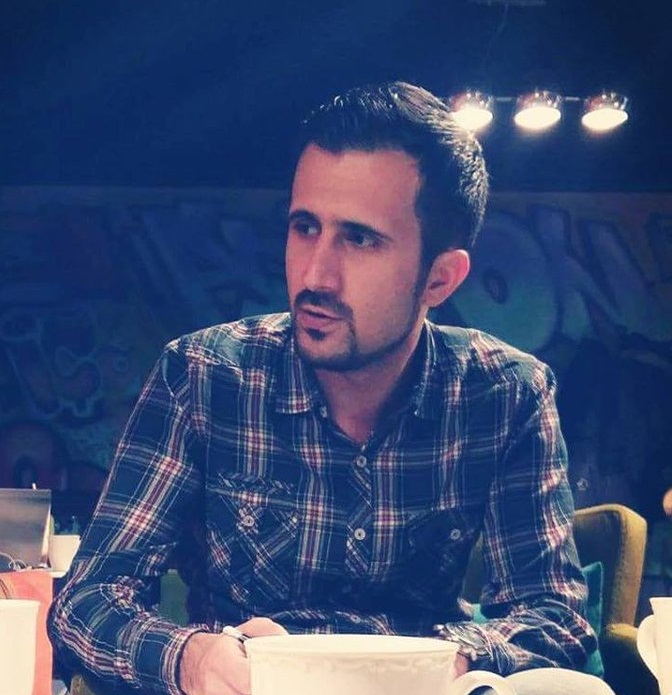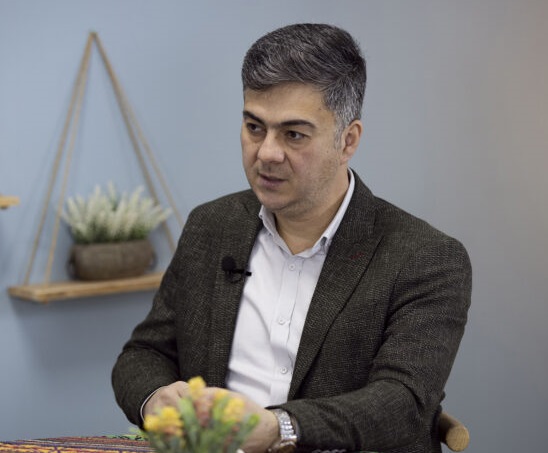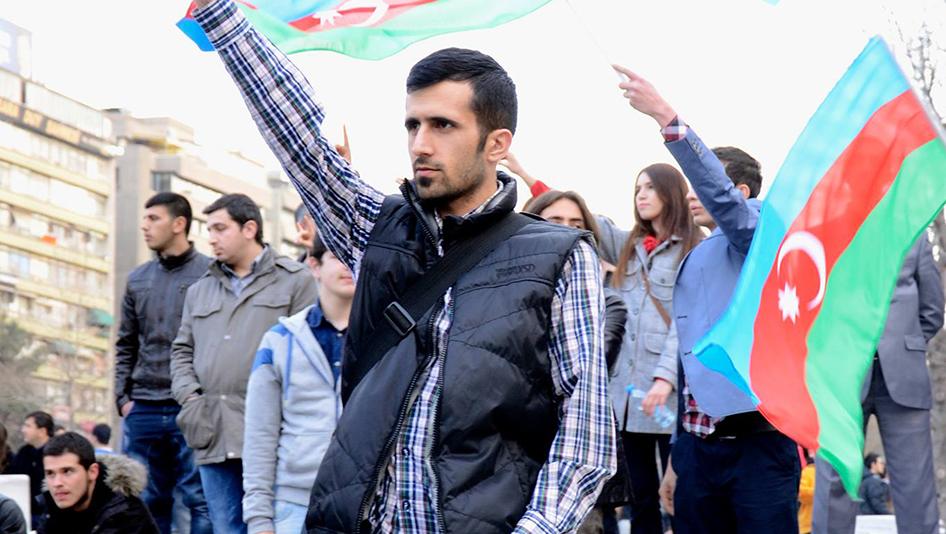
Travel ban for activists in Azerbaijan
Amidst a wave of journalist and civil society arrests in Azerbaijan over the past six months, dozens of activists and media workers have been barred from leaving the country.
They were mostly informed at the airport by the State Border Service that their departure is restricted due to a decision by the Azerbaijani Ministry of Internal Affairs. However, they weren’t given prior notice, finding out only during border control.
- How the adoption of the “foreign agents” bill could affect Georgian-Abkhaz relations. Opinion
- The appellate court upheld the arrest of Anar Mammadli
- Azerbaijan. Professor Gubad Ibadoghlu has been fitted with an electronic monitoring bracelet
One of them is Elgiz Gahraman, a public activist and former political prisoner.
 Elgiz Gahraman
Elgiz Gahraman“On April 19, I had a flight to Tbilisi. I went to the airport, and during passport control, I was told that there was a ‘stop’ on my departure from the country. I mentioned that I couldn’t see any restriction in the online system [on the Ministry of Internal Affairs website, one can check whether there is a travel ban using passport details – JAMnews] and asked who imposed this limitation and why? They said that the Ministry of Internal Affairs imposed the ‘stop,’ but they didn’t have information about the reason,” says Elgiz Gahraman.
In addition to the reason for the restriction, it’s also unclear when it will be lifted, so he had to postpone his planned vacation for the summer.
Elgiz Gahraman was summoned to the Main Police Department of Baku on May 4, two weeks after he was banned from leaving the country. The activist couldn’t share details of the interrogation because he signed a non-disclosure agreement.
“At the police department, they didn’t specify the exact reason for the restriction. They just verbally warned me not to leave the country, and I said that I couldn’t leave the country even if I wanted to,” says the activist.
Gahraman appealed to the court to lift the travel ban. The Khatai District Court dismissed the activist’s complaint during the hearing on April 7. He is preparing to appeal this decision.
“I’ll have to start everything from scratch”
 Narmin Hasanova
Narmin HasanovaAmong those restricted from leaving the country is Narmin Hasanova, the sister of Ulvi Hasanli, the director of the independent online outlet Abzas Media, who was arrested last November.
Narmin Hasanova has been living in Poland for several years. The day before her brother’s arrest, Narmin came to Azerbaijan to visit her family.
“Ten days after my brother’s arrest, I decided to go to Turkey for treatment as I needed a surgery, and from there I planned to return home to Poland. At passport control at the airport, I was told that I was forbidden to leave the country, and no other information was given to me.
I did not receive any notification of the travel ban, and when I checked my details in the official database, there were no restrictions. Border guards told me that some ‘bans’ are not displayed in the system.
Later, it turned out that this restriction was not recorded in the official system because it was imposed illegally.”
Narmin Hasanova has been unable to return to Poland for over five months. She says the travel ban has turned her life upside down. Her treatment was interrupted, and she lost her job in Poland.
“All of this puts my future in question. All my plans have been shattered. Even if the ban is lifted today and I return to my home, I won’t have the life I built for years, much has already been lost. I will have to start over,” says Hasanova.
Over the past five months, she has written to the ombudsman, the Ministry of Internal Affairs, trying to find out the reason for the ban and when it will be lifted. During this period, she was summoned to the Main Police Department and spent about four hours giving testimony as a witness in the “Abzas Media case.” Her questions about the travel ban were left unanswered.
Recently, Hasanova received a written response from the Criminal Investigation Department of the Main Police Department. The response did not clearly indicate the reason for the travel ban, only that “the restriction is related to a criminal case initiated in November 2023 under Article 206.3.2 (smuggling committed by a group by prior conspiracy).” The letter did not explain Hasanova’s connection to this case, nor whether it pertains to the Abzas Media case.
In what cases can a travel ban be imposed?
Lawyer Fariz Namazli informed JAMnews that restrictions on the right of individuals to leave the country can be applied in accordance with the provisions of the migration code and only in the following cases:
- Upon the initiation of a criminal case against a person or the application of any preventive measure;
- Upon the existence of a court verdict;
- When applying compulsory medical measures;
- In the case of conditional conviction or early release from punishment;
- In case of deferred punishment for pregnant women and persons with minor children;
- Upon conscription for military service;
- Upon the existence of a court decision on the temporary restriction of a citizen’s right to leave the country due to non-compliance with court decisions, orders, and administrative acts related to the payment of financial requirements of tax authorities;
- Upon the existence of a court decision on the temporary restriction of a citizen’s right to leave the country due to non-payment of financial sanctions;
- During trips to countries where preventive vaccinations are required according to international health regulations or international agreements to which the Republic of Azerbaijan is a party.
“These restrictions are completely illegal”
 Fariz Namazli
Fariz Namazli“According to the requirements of the law, only the right of a suspect or accused person to leave the country may be restricted in connection with the need for an investigation. The right of other persons involved in the criminal process, including witnesses, cannot be restricted. Currently, these restrictions imposed on witnesses in connection with the criminal prosecution being investigated by the Main Criminal Investigation Department are completely illegal,” says the lawyer.
Fariz Namazly emphasizes that individuals who believe they have been illegally banned from leaving the country can appeal to the court.
“This restriction was imposed on them not by the court, but by the investigative authority. Therefore, they can file a complaint against the investigative authority in court.
I would like to note that similar cases occurred several years ago when a large number of people interrogated as witnesses in a criminal case related to the activities of ‘Meydan TV’ and the ‘NGO case’ were banned from leaving the country. At that time, since the complaints of these individuals were not substantively considered by local courts, they turned to the European Court of Human Rights. In its decision in the case of ‘Mursaliev and Others v. Azerbaijan’ of December 13, 2018, the European Court recognized a violation of the right to freedom of movement of several of these individuals.”
“It was like living in an open-air prison”
This isn’t the first instance of journalists and activists in Azerbaijan being banned from leaving the country. In 2015, when a criminal case was opened against the independent online outlet “Meydan TV,” more than ten employees of the media organization were banned from leaving the country.
“I found out that I was banned from leaving the country on my way to Sweden, and they turned me back from the airport. I wasn’t informed about this beforehand. They didn’t even say which authority imposed the ban at the airport. We wrote to the State Border Service, the Prosecutor General’s Office, and the Ministry of Internal Affairs. After a long struggle with the help of lawyers, we found out that the ban was imposed by the Prosecutor General’s Office. The criminal case related to the activities of ‘Meydan TV’ was also initiated by this agency,” says Meydan TV editor Aygun Elgunesh.
According to the journalist, the travel ban, among other things, is a method of psychological pressure.
“It was like living in a prison under the open sky. It affected me badly because I had health problems. I had to postpone an important surgery, and as a result, I lived with unbearable pain for a long time,” says Elgunesh.
Although she and other Meydan TV staff members appealed to the courts, local judicial authorities did not grant their complaints.
“In addition, we held rallies in front of the Investigation Department of the Prosecutor General’s Office and organized online campaigns. We wrote to international organizations and gave interviews to foreign media. Our case reached the European Court. Eventually we achieved results.”
After a four-year struggle, the travel ban on Aygun Elgunesh and her colleagues was lifted.


